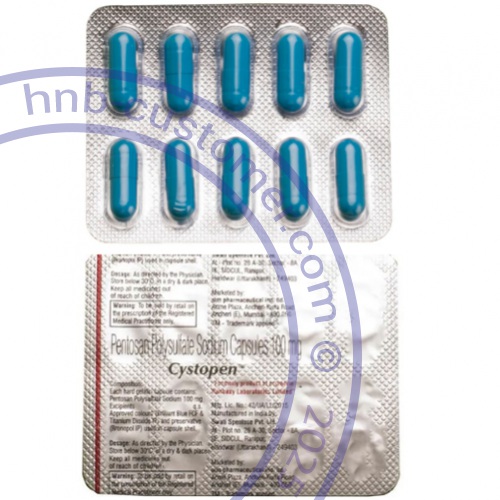Pentosan polysulfate sodium capsule
What is pentosan polysulfate sodium?
Pentosan polysulfate sodium is used to treat bladder pain and discomfort caused by cystitis (bladder inflammation or irritation).
Pentosan polysulfate sodium is for use in adults and children at least 16 years old.
Pentosan polysulfate sodium may also be used for purposes not listed in this medication guide.
Warnings
Taking pentosan polysulfate sodium can make it easier for you to bleed. Call your doctor at once if you have any unusual bleeding (nosebleed, blood in your urine or stools, rectal bleeding, coughing up blood, bleeding gums).
Before taking this medicine
You should not use pentosan polysulfate sodium if you are allergic to it.
Tell your doctor if you have ever had:
- a bleeding or blood clotting disorder;
- eye problems (especially a problem with your retina) in you or a family member;
- an aneurysm or stroke;
- a stomach ulcer, intestinal polyps or diverticulitis; or
- liver disease.
Tell your doctor if you are pregnant or breastfeeding.
How should I take pentosan polysulfate sodium?
Follow all directions on your prescription label and read all medication guides or instruction sheets. Use the medicine exactly as directed.
Take pentosan polysulfate sodium with a full glass of water. Take on an empty stomach, at least 1 hour before or 2 hours after a meal.
Swallow the delayed-release capsule whole and do not crush, chew, break, or open it.
Your doctor will need to check your progress every 3 months to help determine how long to treat you with pentosan polysulfate sodium. You may also need blood tests and vision examinations to check for certain side effects.
If you need surgery, tell your surgeon you currently use this medicine. You may need to stop for a short time.
Store at room temperature away from moisture and heat.
What should I avoid while taking pentosan polysulfate sodium?
Ask a doctor or pharmacist before using any medicine that contains aspirin, ibuprofen, or similar ingredients. This includes medicine for pain, fever, swelling, or cold/flu symptoms.
Pentosan polysulfate sodium side effects
Get emergency medical help if you have signs of an allergic reaction: hives; difficulty breathing; swelling of your face, lips, tongue, or throat.
Call your doctor at once if you have:
- nosebleeds, bleeding gums;
- blood in your urine or stools;
- rectal bleeding;
- coughing up blood;
- a light-headed feeling, like you might pass out; or
- vision problems (blurred vision, trouble reading, trouble seeing in low light).
Common side effects may include:
- bruising, blood in your stools;
- hair loss;
- nausea, diarrhea, upset stomach;
- headache;
- swelling, weight gain;
- dizziness;
- rash; or
- abnormal liver function tests.
What other drugs will affect pentosan polysulfate sodium?
Tell your doctor about all your other medicines, especially:
- a blood thinner--warfarin, Coumadin, Jantoven;
- medication used to prevent blood clots--apixaban, heparin, rivaroxaban, Eliquis, Xarelto, and others; or
- NSAIDs (nonsteroidal anti-inflammatory drugs)--aspirin, ibuprofen (Advil, Motrin), naproxen (Aleve), celecoxib, diclofenac, indomethacin, meloxicam, and others.
This list is not complete. Other drugs may affect pentosan polysulfate sodium, including prescription and over-the-counter medicines, vitamins, and herbal products. Not all possible drug interactions are listed here.





